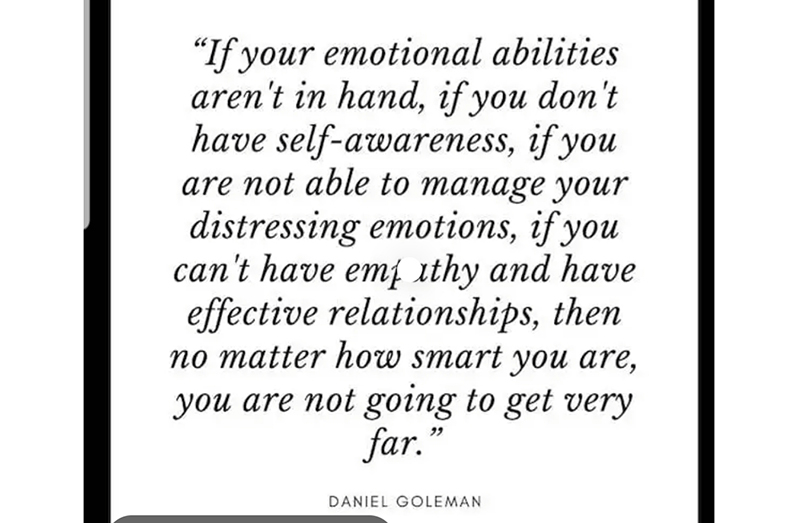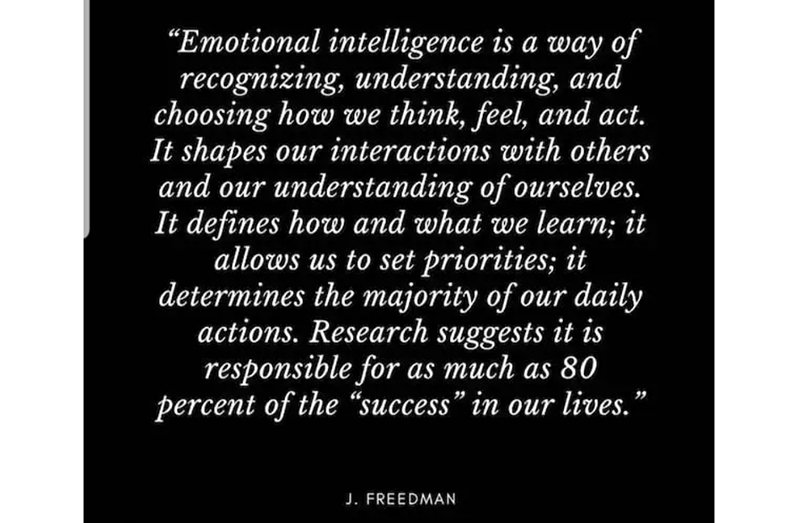FOR the last few weeks, this column was focused on the importance of personal development, superior customer service and Etiquette for Tomorrow’s Leaders. I have engaged in many conversations on chief executive officers (CEOs) and entrepreneurs who are hiring. One thing that stands out in many cases is that Emotional Intelligence is playing a major role and more so in recent years. I was reading a very interesting article in Forbes online by Dr Tracy Brower, on how vital are interpersonal skills .. I decided to share it because I believe many can benefit from the content.
“The good news is that companies are hiring, but there is still significant competition for the best jobs. Of course, there is plenty of advice about what can set you apart and help you get the most in-demand roles—but at the top of the list are interpersonal skills. They are what employers want, and what can propel you ahead of other applicants.
What are interpersonal skills? They are essentially your ability and competence in building relationships with the people around you—relationships which are effective, constructive and rewarding.
And you won’t want to take interpersonal skills for granted. You need to be intentional about building them, but also in in highlighting those which are most important to employers and making the case for your strong interpersonal abilities..
Start with Self Awareness
 Interpersonal skills always start with self-awareness. You need to understand yourself in order to relate well with others—what’s important to you, what you may struggle with, your hot buttons, how you react to situations and how you respond to others.
Interpersonal skills always start with self-awareness. You need to understand yourself in order to relate well with others—what’s important to you, what you may struggle with, your hot buttons, how you react to situations and how you respond to others.
In one poll 77% of managers said EQ (Emotional Quotient , otherwise known as Emotional Intelligence), was very important and they’ve used it increasingly in the last two years. In addition, 81% said their leadership is paying attention to EQ and evaluating it in performance reviews. This is according to a poll by Capterra. The bottom line: It’s wise to develop your EQ for getting the job, and also maintaining it through great performance.
When you’re being considered for a new job, give examples of how your self-awareness has guided you in relationships. Perhaps you were aware of your strong opinions on a topic, but you noticed someone else was sensitive about it and you intentionally asked more questions and avoided coming on too strong with your perspectives. Or maybe you were aware of your own limitations on a work problem, and you were able to ask for help from team members and rely on their support in a key area.
2. Communicate Brilliantly
Another hallmark of interpersonal skills is the ability to communicate effectively. Employers seek communication skills in 28% of jobs, according to data analysis by Adzuna. It makes sense since communication is the lifeblood of strong relationships.
Think of these as communication skills as both sending and receiving information. Sending information includes expressing your point of view and sharing information clearly. Receiving information includes skills in paying attention to others, asking questions, listening and being open.
Communication skills also encompass both verbal and nonverbal channels of communication—and the feedback processes which help you continually adjust how you’re behaving so you can build the best relationships.
Tell stories about how you effectively shared key information or expertise to contribute to a deliverable—or how you listened to a colleague so you could tap into their novel ideas as part of an innovative process. And of course, demonstrate your openness and ability to articulate your ideas during interviews.
3. Collaborate Constructively
It’s no surprise that interpersonal skills also encompass collaborating and working effectively within a team. Few elements of work don’t include a collaborative component somewhere along the way—so employers want to know you have the ability to manage relationships effectively in a collegial environment.
Skills in teamwork are required in 8% of jobs and they, along with skills in collaborating and coaching, are in the top 20 competencies sought by hiring managers, according to the Adzuna data. In addition, 74% of leaders say cooperation is one of the top two power skills necessary for success, according to the Capterra poll.
Talk with hiring leaders about your ability to work with the team, perceive what the team needs to move forward, add your unique capabilities, follow through and help ensure all team members are valued and brought in effectively to achieve results.
 4. Manage Conflict and Solve Problems
4. Manage Conflict and Solve Problems
Closely related to teamwork is the ability to manage conflict and solve problems. Challenges and disagreements are a natural part of working with others, so the ability to deal with difficult situations is what employers are looking for. In fact, 74% of managers say conflict resolution is one of the most important power skills to develop, according to the Capterra data.
Working through challenges also requires flexibility—something required for a whopping 35% of jobs, according to Adzuna data.
When you’re speaking with potential employers, give examples of how you’ve worked through challenges or difficult conversations; and be specific about how you’ve demonstrated flexibility to solve problems, innovate and work effectively with team members, especially in cases where you may have had conflicting approaches.
Tell the story of how you and a colleague came from opposite viewpoints, but were able to work through differences and achieve a breakthrough on a project. Or talk about the time you had an opposing value from a coworker, but were able to put aside your differences to achieve positive results for the customer. Give examples about how you were able to adjust your approach in the face of new information or shifting market conditions.
All of these will get employers’ attention and appreciation for your interpersonal skills.
5. Lead and Influence Others
Employers are also looking for your ability to lead and influence others effectively—and these are part of interpersonal skills as you create relationships where you can engage, motivate and persuade others.
Skills in management are the most in-demand of all skills, with 36% of jobs requiring them—and 12% of jobs specifying leadership skills, according to Adzuna. In fact, management skills were the top priority for the areas of accounting and finance, energy, engineering, HR, IT, legal, PR and scientific industries, based on Adzuna data.
Be sure to give potential employers examples of your interpersonal prowess in leading and influencing others. Talk about the time you stepped forward to help your team get un-stuck when they faced a customer complaint or the time you were promoted based on your positive influence on the team and your ability to inspire colleagues through a challenge.
6. Express Your Energy
Organizations also hire for attitude and energy. You don’t have to be positive all the time, nor do you have to express irritating levels of enthusiasm, but companies want to hire people who are committed and dynamic.
In fact, 13% of jobs specified they wanted people who were friendly, 11% wanted people who were confident, 7% wanted enthusiasm and 5% wanted motivation—and all of these were in the top 20 of traits hiring managers want, according to Adzuna.
Life is tough and work can be stressful—so bringing a great approach and attitude will set you apart. You can give examples of times you were recognized for your enthusiasm, and you can be sure to show your positive approach in interviews as well.
7.Create Your Future
The time is now to find a great role, and skills in creating, building and sustaining great relationships—interpersonal skills—will make you invaluable to hiring managers. Focus on the interpersonal skills which include self-awareness, communication, collaboration, conflict management, leadership and attitude.
In addition, use the dual approach of giving examples of where you’ve excelled with the skills while also demonstrating them through the selection process.
Interestingly, the people who hire you have the most investment in your success—and the relationships you build in the recruiting process are the start of connections that will reward you (and others) for years to come.”
Let’s identify some things that can improve of interpersonal skills as we continue to celebrate this journey called LIFE BEYOND THE RUNWAY.




.png)









